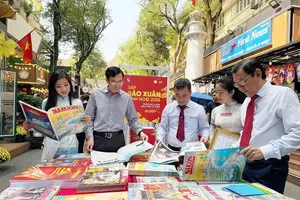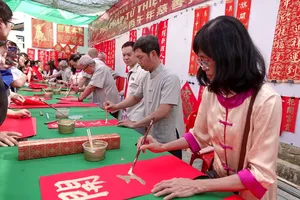
Head of the International Cooperation Department under the Ministry of Culture, Sports and Tourism Nguyen Phuong Hoa said at a conference collecting opinions from experts, researchers, and culture insiders on promoting potentials and solving challenges in the development of sustainable and key cultural industries which was held by the Vietnam National Institute of Culture and Arts Studies (VICAS) and the Copyright Office of Vietnam (COV).
Accordingly, the establishment of the Film Development Fund, Digital Culture Support Fund, Arts Support Fund, Value Added Tax (VAT) reduction for cultural products and services will allow businesses to calculate arts and culture sponsorship and add it to their expenses.
Furthermore, the State needs to create a favorable environment and ecosystem for businesses to operate effectively, integrate the development strategies of creative cultural industries with other related strategies, making them into parts of the social-economic development plan, provide vocational training strategies and support strategies for small and medium-sized enterprises, she added.
Musician Quoc Trung, who produces several major music events in the country also pointed out the gaps in the support mechanisms and policies for artists who are working at home and abroad. It needs to erase the boundaries between state and non-state sectors to promote the general creative enthusiasm of artists, he suggested.
Director of Hanoi Grapevine's Online Creative Space, Truong Uyen Ly, said that despite advancements in public-private relationships, it still needs to materialize issues of taxes, tax rates, tax norms, and tax deadlines that significantly impact businesses.
Chairman of Le Media Group (Le Bros) Le Quoc Vinh stated that the cultural industry must encompass all elements of a market economy, including enterprises (investors, business managers), production operations block, creative practitioners (artists), distribution intermediaries, consumers (customers, audiences), and managers. Of those, enterprises and investors play a crucial role among these parties. Therefore, the State should encourage and support enterprises to boldly invest in culture.
Head of the Vietnam National Institute of Culture and Arts Studies (VICAS), Nguyen Thi Thu Phuong said that the National Strategy for the Development of Vietnamese Cultural Industries has created positive changes. In 2022, Vietnam's cultural industries contributed an estimated 4.04 percent to GDP and created one million jobs.
According to Head of the Copyright Office of Vietnam (COV) under the Ministry of Culture, Sports and Tourism Tran Hoang, the cultural industries such as film, performing arts, music, design, traditional crafts, and games have contributed to improving the material and spiritual life of the people, preserving and promoting the national cultural identity, and become a driving force for the economic growth over the past ten years.
Of this, the film sector generated a revenue of around VND3,700 billion (US$151 million), including the Vietnamese film revenue reached VND1,500 billion.
























